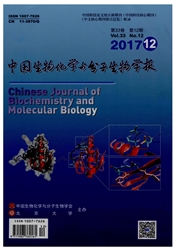

 中文摘要:
中文摘要:
血管生成素(angiogenin,ANG)调控细胞增殖、迁移、分化等生物学过程,但其作用的分子机制尚未完全明了.目前认为,ANG可结合到r DNA区域促进r RNA转录,也可能与mRNA有结合.为全面鉴定细胞内可结合ANG的基因组序列,我们利用染色质免疫共沉淀结合DNA芯片技术(Ch IP-chip)对He La细胞的基因组DNA进行了筛选,共获得了1 248个结合片段.我们进一步分析了这些结合片段附近分布的基因,发现有699个可能受ANG结合调控的基因.基因注释和聚类分析显示,这些可能受ANG调控的基因主要与肿瘤发生发展有关(特别是结直肠癌和前列腺癌),并且与TGF-β和Wnt信号通路相关.最后,我们验证了ANG不仅与WNT6、CCNE1、APC2、FZD8和EGFR基因的启动子区域有直接结合,而且调控其表达.以上研究结果为深入研究ANG的功能机制提供了线索.
 英文摘要:
英文摘要:
Angiogenin (ANG) regulates cell proliferation, migration, differentiation and other biological processes, but the molecular mechanism of ANG function is not fully clear. It has been reported that ANG bound rDNA to enhance rRNA transcription, or might also bind to mRNA coding regions. To screen and identify angiogenin binding sites genome-wide, we employed the technology of chromatin immunoprecipitation coupled with microarray (ChiP-chip) and identified a total of 1 248 binding sites using genomic DNA from HeLa cells. We found 699 potential angiogenin-regulating genes by annotating the genes near the binding sites. Gene annotation and cluster analysis results showed that these genes associated to tumorigenesis and progression linked to TGF-β and Wnt signaling pathway, especially for colorectal and prostate cancers. We verified that angiogenin bound to the promoter regions of the WNT6, CCNE1, APC2, FZD8 and EGFR genes to regulate their expression. These findings provided clues for understanding the mechanisms of angiogenin functions.
 同期刊论文项目
同期刊论文项目
 同项目期刊论文
同项目期刊论文
 期刊信息
期刊信息
